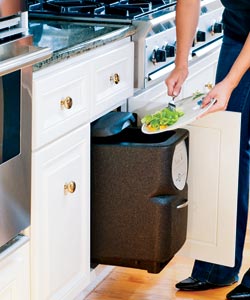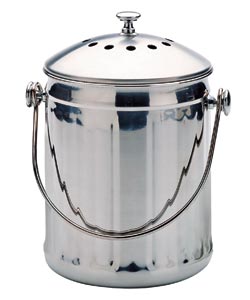
The NatureMill composter (above) creates compost in-house; the Endurance Compost Pail (below) holds kitchen scraps, pending further action. |
 |
A. More attractive than a large yogurt container, you mean? Yes, it turns out there is. The Endurance Compost Pail is a darling countertop receptacle designed to look like the classic galvanized metal trash can. It holds about a gallon of "greens" and has a vented lid with a carbon filter that eliminates odors; a handle makes it easy to carry. It’s available at A Cooler Planet (2211 W. Roscoe St., 773-248-1110; itsacoolerplanet.com) for about $40.
Also check out the Kitchen Scrap Carrier ($19.95) at eco-gardening.com. It’s a rectangular plastic bucket that holds about two gallons of waste, with an opening wide enough that you can scrape a plate right into it. It has a vented, filtered lid and a handle and can sit on the counter or hang from two screws mounted inside a cabinet door.
Another solution is to eliminate the middleman and make compost right in your kitchen. The NatureMill Automatic Indoor Composter uses electricity to mix and aerate kitchen scraps and turn them into compost without odors. Food waste, including dairy, meat, and fish, can be put into the top chamber, up to 120 pounds per month. It takes the machine about two weeks to turn your garbage into luscious compost.
You might wonder if you’re canceling out any benefit to the environment by using electricity to compost, but the people who make the NatureMill say the unit uses about 50 cents’ worth of electricity a month—less impact than a garbage truck that would burn diesel fuel to haul the same waste. The unit comes in two models, both 20-by-20-by-12 inches. The Plus is $299; the Pro is $399 and has a few added features such as a foot pedal, a vacation mode, heavy duty stainless steel components, and a selection of colors. Both can be found at A Cooler Planet.
The Happy Farmer Kitchen Composter is a non-electric indoor system that decomposes kitchen waste without odors. A simple plastic bin with a lid, a handle, a strainer, and a spigot, it is 10-by-10-by-16 inches, holds five gallons, and fits in the cabinet under the sink.
To get started, you put down a layer of bokashi (Japanese for "fermented organic matter"), which is available from Happy Farmer, and then every time you deposit kitchen waste—including meat and dairy—you add more bokashi, securing the lid each time. When the composter is full, you let it sit, unopened, for two weeks. Then you dump the fermented food waste into your yard, mix it with soil, and let it compost for another two weeks before using it in your garden. The Happy Farmer starter kit, including bokashi, is $69.99 at A Cooler Planet.
JUST ASK Have a design or renovation question? We’ll do our best to answer it. E-mail us at chicagohome@chicagomag.com. Sorry, we cannot take questions by phone, or guarantee individual responses.


